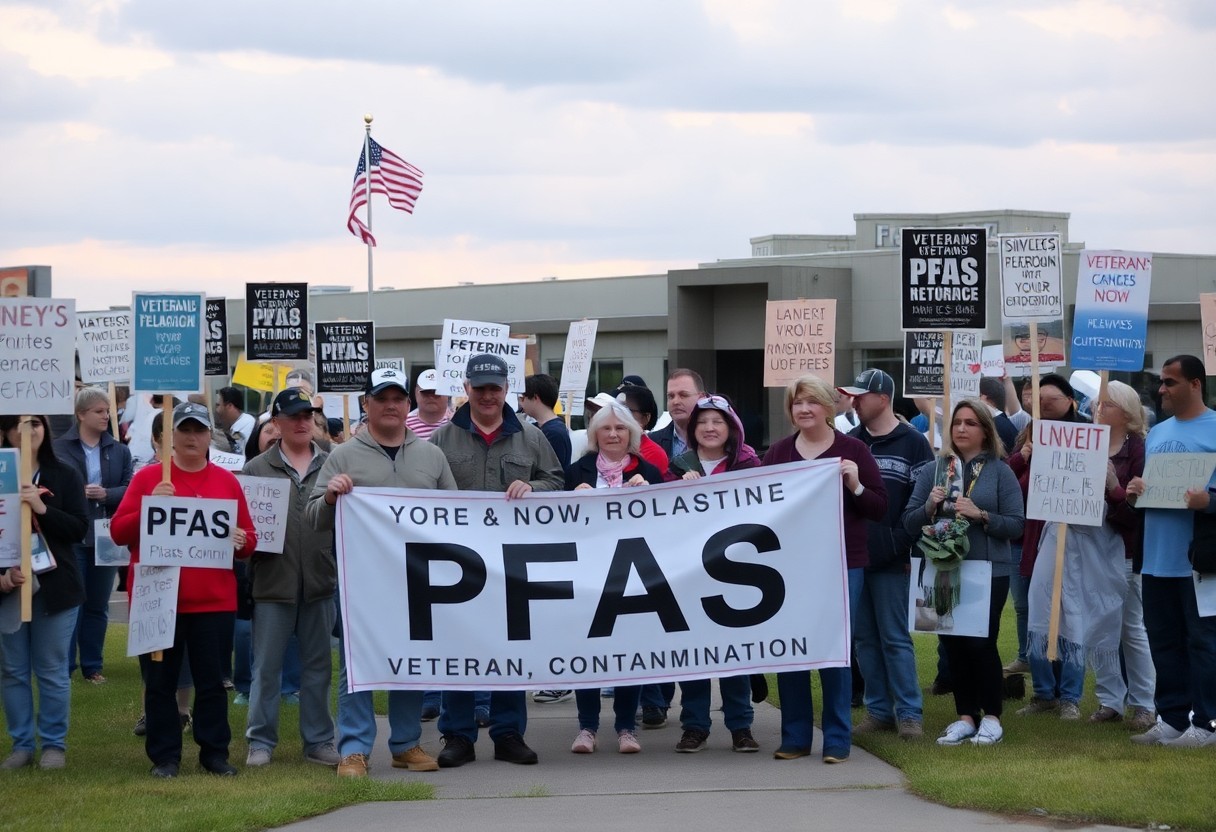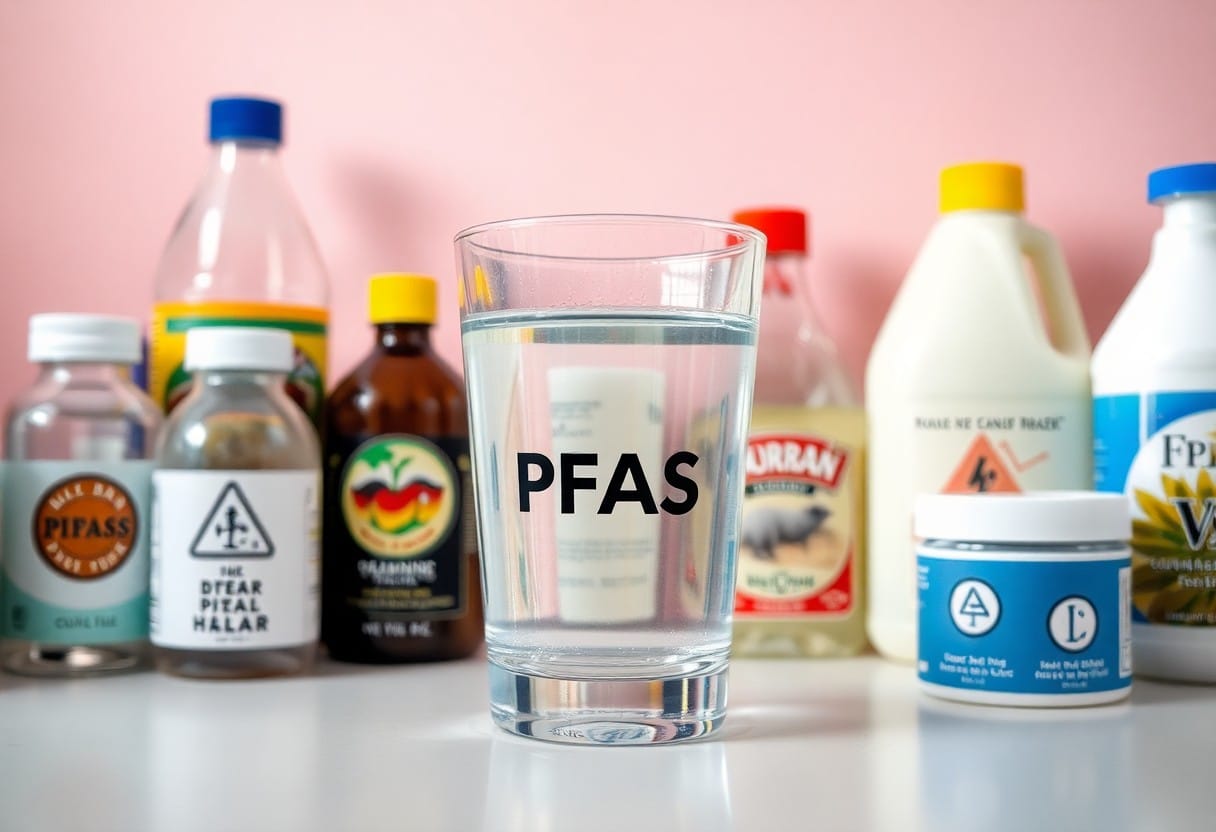You may be unaware, but PFAS (per- and polyfluoroalkyl substances) pose a significant threat to your health and the environment in Fayetteville, largely due to ongoing pollution from the Chemours facility. These harmful chemicals, known for their durability, have been linked to serious health issues, including increased cancer risks and hormonal disruptions. It is necessary for you to stay informed about the sources, impacts, and potential solutions to combat this persistent issue, ensuring the well-being of your community and future generations.

Understanding PFAS
For many individuals, PFAS represents an unfamiliar yet pervasive environmental issue. Per- and polyfluoroalkyl substances (PFAS) are synthetic chemicals that have been widely used in various industries since the 1940s. You may find these substances in products like non-stick cookware, stain-resistant fabrics, and firefighting foams. Their persistence in the environment and human body poses a significant challenge to public health.
Definition and Origins
By definition, PFAS includes a broad group of over 4,700 chemicals that are resistant to water, grease, and heat. Initially developed for their water-repellent properties, they gained widespread adoption in consumer goods and industrial applications. Their long-lasting nature means they accumulate in the environment and the human body, leading to growing concern about their safety.
Health Impacts of PFAS
Across multiple studies, researchers have identified alarming health issues associated with PFAS exposure. These include weakened immune responses, elevated cholesterol levels, and an increased risk of certain cancers. You should be aware that PFAS can also cause developmental issues in infants and children, affecting overall health and growth. Understanding these health implications is vital for safeguarding your family’s wellbeing in areas affected by PFAS pollution.
PFAS are linked to significant health risks that you may not be aware of. Studies indicate that exposure to these substances can lead to hormonal disruptions, increased blood pressure, and adverse effects on fetal development. Your body’s ability to combat infections can also be impaired due to immune system suppression caused by PFAS. By learning about these health impacts, you can take informed steps to mitigate exposure and advocate for cleaner environments in your community.
Chemours and Fayetteville
The presence of Chemours in Fayetteville has significantly impacted the local community, particularly through its production and release of hazardous chemicals. As a major chemical manufacturer, Chemours operates facilities that not only contribute to economic activity but simultaneously pose serious risks to public health and the environment.
History of Chemours’ Operations
For decades, Chemours has been involved in the production of various chemicals, including per- and polyfluoroalkyl substances (PFAS), used in numerous industrial and consumer products. Established as a spin-off of DuPont, the company has continued operations that have raised concerns about their environmental impact, particularly in the Fayetteville area.
Release of PFAS into the Environment
Before the awareness of PFAS risks gained mainstream attention, Chemours had been releasing these compounds into the environment, affecting air, water, and soil quality in Fayetteville.
Even prior to recent regulations, Chemours had contaminated local water supplies with per- and polyfluoroalkyl substances (PFAS), which are known for their persistence in the environment and human body. These chemicals pose a serious health risk, being linked to various adverse effects, including liver damage, developmental issues, and increased cancer risk. Due to inadequate oversight, you may find that your community’s water sources have been tainted, raising urgent concerns regarding public health and the need for increased scrutiny and regulatory measures to ensure safety and accountability.
Environmental Consequences
Any discussion of PFAS pollution in Fayetteville must address the alarming environmental consequences stemming from the contamination caused by Chemours. With these chemicals lingering in the environment, they pose a serious threat to public health and wildlife across the region.
Contamination of Water Sources
For residents of Fayetteville, the contamination of local water sources is a direct consequence of PFAS pollution, leading to potential long-term health risks. This persistent presence in both drinking and recreational water can endanger your family’s health and disrupt daily life.
Effects on Local Ecosystems
Around Fayetteville, PFAS contamination significantly impacts local ecosystems, posing risks to wildlife and plant life. As these chemicals accumulate in soil and water, you may notice changes in biodiversity, affecting both the flora and fauna that depend on these habitats.
Hence, the infiltration of PFAS into local ecosystems can have far-reaching impacts. Fish and wildlife exposed to these contaminants may experience reproductive issues and developmental malformations, threatening species survival. Additionally, the disruption of food chains can lead to a decline in animal populations, affecting everything from insects to large mammals. This interconnectedness means that the health of your environment relies heavily on mitigating these pollutants to ensure a balanced ecosystem for future generations.
Public Health Concerns
All residents in Fayetteville should be aware of the serious public health concerns posed by PFAS pollution. These chemicals have been linked to various health issues, including hormonal disruption, immune system problems, and certain cancers. The ongoing presence of these substances in your drinking water and environment raises alarms about long-term health impacts that are still being investigated.
Community Health Statistics
Beside the alarming presence of PFAS, community health statistics indicate rising rates of chronic illnesses in Fayetteville. Recent studies show an increase in conditions such as thyroid disease and liver complications. Monitoring these trends is vital to understanding the full impact of PFAS exposure on your community’s health.
Vulnerable Populations
For many individuals in Fayetteville, certain populations are at higher risk from PFAS exposure, including children, pregnant women, and those with pre-existing health conditions. These groups may experience more severe effects from pollutants, making it imperative to address their needs.
To protect your community, it’s important to focus on vulnerable populations who face heightened risks due to PFAS exposure. Children are still developing and may suffer from cognitive and behavioral issues linked to these pollutants. Additionally, pregnant women could experience complications, potentially affecting the long-term health of their children. Those with pre-existing health conditions may encounter exacerbated symptoms, leading to greater healthcare needs. Prioritizing these groups in health initiatives ensures you advocate for a healthier future for all in Fayetteville.
Regulatory Actions
Your awareness of North Carolina ‘Forever Chemical’ Plant Violates Human … concerns is vital as regulatory measures continue to evolve in response to PFAS pollution. Government agencies at various levels are increasing scrutiny on emissions from Chemours, striving to hold the company accountable for its environmental impact and safeguarding public health.
Current Regulations and Standards
After extensive testing and mounting evidence linking PFAS to health issues, current regulations are being reevaluated. Standards are tightening, aiming to limit allowable PFAS levels in water supplies and requiring manufacturers to disclose chemical usage more transparently, ultimately fostering greater accountability.
Advocacy and Community Response
At the grassroots level, community advocacy has galvanized local residents to demand stronger regulations and accountability from Chemours. Activist groups are organizing educational campaigns, lobbying for policy changes, and working with state officials to ensure that your concerns are heard, pushing for swift action against PFAS pollution.
The community’s response has been a powerful force in raising awareness about the dangers of PFAS pollutants. Local residents have banded together to pressure regulators and lobby for stricter laws. Their efforts emphasize the life-threatening implications of water contamination and the need for immediate remediation. Through public forums and protests, your voice joins a chorus demanding change and insisting that Chemours and other manufacturers prioritize public health over profit.
Ongoing Research and Solutions
Many researchers and environmental agencies are actively studying PFAS pollution in Fayetteville to understand its full impact on public health. This ongoing research is important in identifying the extent of contamination, the pathways of exposure, and developing strategies to mitigate these risks. Collaborative efforts among scientists, policymakers, and communities aim to establish effective regulations and cleanup methods that will ensure your safety and that of future generations.
Scientific Investigations
Below, you’ll find a summary of current scientific investigations focusing on PFAS. Researchers are using advanced techniques to assess water, soil, and air samples for PFAS concentrations, helping to determine the sources and spread of contamination. These findings are vital for informing public health interventions and regulatory measures, aiming to safeguard your community from these hazardous chemicals.
Remediation Efforts
Any effective remediation efforts focus on removing PFAS contaminants from the environment. These methods include advanced filtration systems for drinking water and soil treatment technologies, which can help restore contaminated sites. Communities are increasingly advocating for these practices, as they are important for ensuring your health and well-being.
Also, various innovative remediation strategies are being explored to effectively address PFAS pollution. Activated carbon filtration and reverse osmosis are among the promising technologies being implemented to treat drinking water contaminated with PFAS. Additionally, techniques like thermal destruction and chemical treatment are being tested to break down these persistent pollutants in contaminated soil and groundwater. These efforts not only aim to reduce PFAS levels but also promote sustainable practices that protect your community and restore the environment for future generations.
Final Words
Now that you are aware of PFAS pollution in Fayetteville and Chemours’ ongoing threat to public health, it’s important for you to stay informed and advocate for clean water in your community. The presence of these “forever chemicals” poses serious health risks, and your awareness can drive change. You can learn more about related pollution issues through resources like Forever chemicals found in air pollution near Fayetteville …. Your engagement will help protect your health and the environment.



















